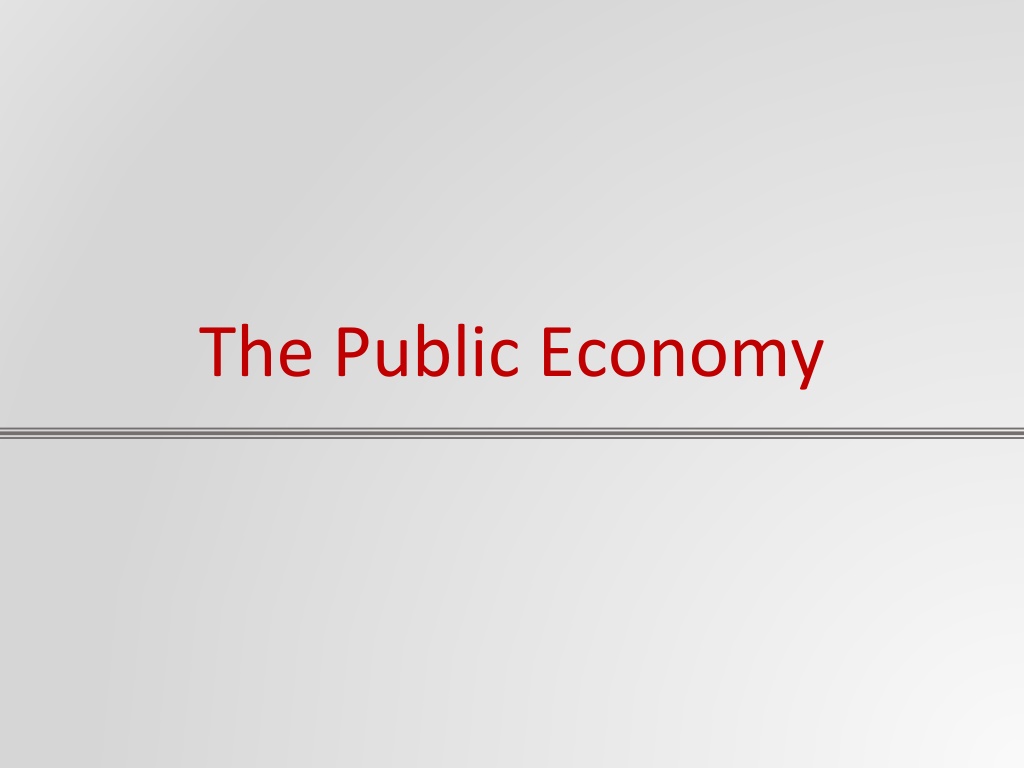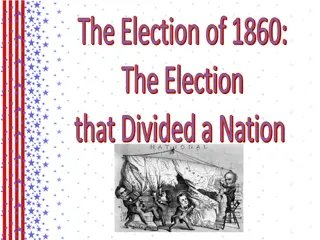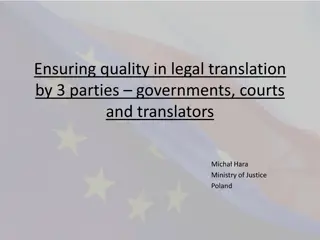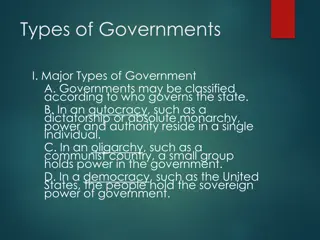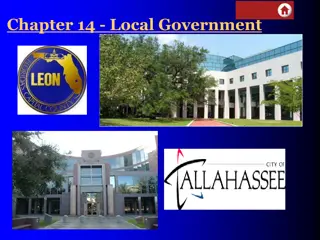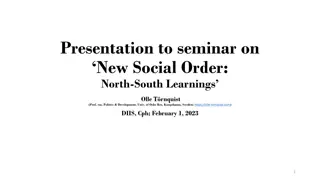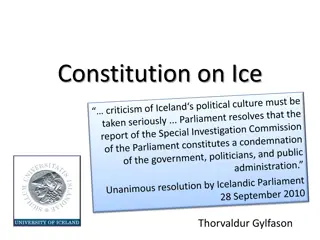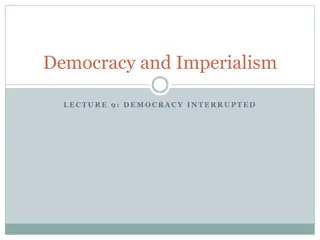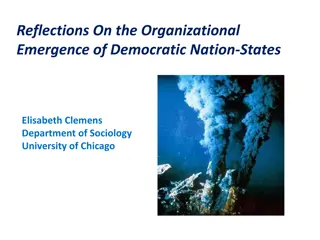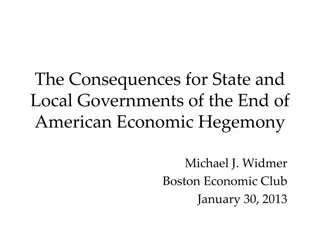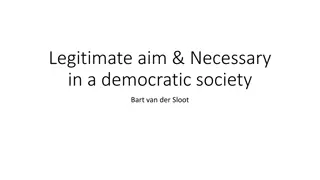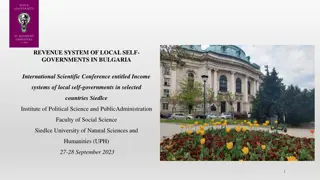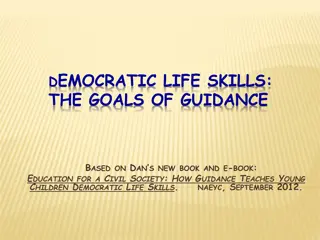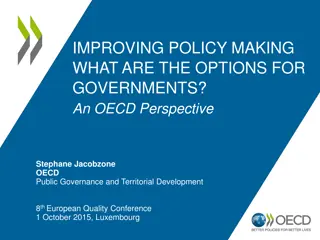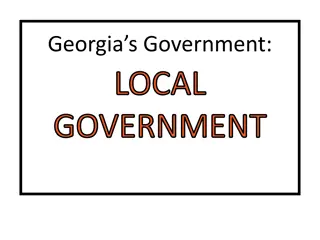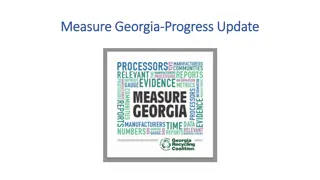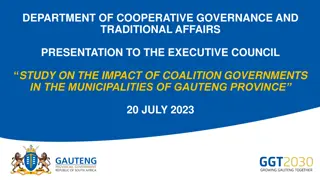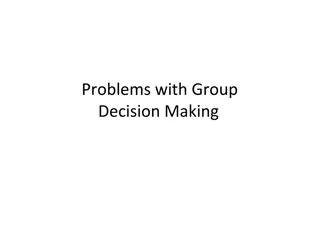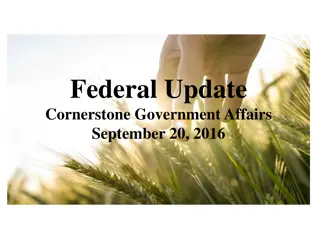Challenges of Democratic Governments in Economic Policy Making
Democratic governments face challenges when enacting economic policies due to the influence of voter participation, special interest politics, and the limitations of majority rule. This presentation explores the complexities of democratic decision-making in economic matters, examining the impact of political institutions and societal preferences on policy outcomes.
Download Presentation

Please find below an Image/Link to download the presentation.
The content on the website is provided AS IS for your information and personal use only. It may not be sold, licensed, or shared on other websites without obtaining consent from the author. Download presentation by click this link. If you encounter any issues during the download, it is possible that the publisher has removed the file from their server.
E N D
Presentation Transcript
Acknowledgments This PowerPoint presentation is based on and includes content derived from the following OER resource: Principles of Microeconomics An OpenStax book used for this course may be downloaded for free at: https://openstax.org/details/books/principles-microeconomics 2
Key Questions What are the challenges faced by democratic governments in enacting economic policies? How does voter participation influence economic policies? What are special interest politics and how do they influence economic policies? Can majority rule correctly identify what the public wants? 3
Can Democratic Governments Enact Sensible Economic Policies? (1 of 2) Democratic governments react to voters, not just to analyses of demand and supply curves. Political institutions also play a role in allocating society s scarce resources, and economists have played an active role, along with other social scientists, in analyzing how such political institutions work. 4
Can Democratic Governments Enact Sensible Economic Policies? (2 of 2) Just as markets can face issues and problems that lead to undesirable outcomes, a democratic system of government can also make mistakes, either by: enacting policies that do not benefit society as a whole, or by failing to enact policies that would have benefited society as a whole. 5
Voter Participation and Costs of Elections In other countries, the share of adults who vote is often higher than the U.S. In Germany, Spain, and France, 75% to 80% of voting age citizens cast ballots. Australia, Belgium, Italy, Greece, Turkey, Singapore, and most Latin American nations have laws that require voting. In U.S. presidential elections over the last few decades, about 55% to 65% of voting-age citizens actually voted (U.S. Census). In congressional elections when there is no presidential race, or in local elections, the turnout is often less than half of the eligible voters. 6
Voter Participation and Reasons Even if the law can require people to vote, no law can require that each voter cast an informed or a thoughtful vote. Discussion question: Why do you think that people choose not to vote? One answer is rational ignorance which means that people will not vote if the costs of becoming informed and voting are too high, or they feel their vote will not be decisive in the election. 7
Voting Behavior Research on voting behavior has indicated that people who are more settled or more connected to society tend to vote more frequently. Without greater voter turnout, politicians elected by the votes of 60% or fewer of the population may not enact economic policy in the best interests of 100% of the population. 8
U.S. Spending on Campaigns: How Much is Too Much? The $6.8 billion spent on political campaigns in 2016 was about one-fourth of one percent of the overall economy. In the context of the enormous U.S. economy, $6.8 billion is not as much money as it sounds. Another way to think about campaign spending: U.S. consumers spend about $2 billion per year on toothpaste and $7 billion on hair care products. In 2016, Proctor and Gamble spent $7.2 billion on advertising. Is it sensible to believe the United States is going to decide its presidential elections for much less than Proctor and Gamble spends on advertisements? 9
Special Interest Politics Special interest groups are groups that are small in number relative to the nation, but well organized and thus able to exert a disproportionate effect on political outcomes. Can pressure legislators to enact public policies that do not benefit society as a whole. A number of economic policies produce gains whose beneficiaries are easily identifiable, but costs that are partly or entirely shared by a large number who remain anonymous. A democratic political system probably has a bias toward those who are identifiable. 10
An Example of Special Interest Politics A tariff on tires imported from China would increase the price of tires in the U.S. But U.S. tire manufacturers may not favor the tariff, because most of them also import tires from China and other countries. However, the steelworkers union, lobbied fiercely for the tariff. With this tariff, the cost of all tires increased significantly. Alternately, policies could block imports. Will benefit the firms that would have competed with those imports, as well as workers at those firms - who are likely to be quite visible. Consumers who would have preferred to purchase the imported products, and who thus bear some costs of the protectionist policy, are much less visible. Policy that is biased toward those who are identifiable. 11
Special Interests and Lobbyists Special interest groups may develop a close relationship with one political party, so their ability to influence legislation rises and falls as that party moves in or out of power. A special interest group may even hurt a political party if it appears to a number of voters that the relationship is too cozy. Special interest lobbyists talk with the legislators who are writing the legislation and may suggest alternative wording. They contribute to the campaigns of legislators on the key committees - and may even offer those legislators high-paying jobs after they have left office. For this reason, it often turns out that those regulated can exercise considerable influence over the regulators. 12
Pork Barrel Spending and Log Rolling Pork-barrel spending - legislation that benefits mainly a single political district. Logrolling - an action in which all members of a group of legislators agree to vote for a package of otherwise unrelated laws that they individually favor. Can encourage pork barrel spending. 13
Pork Barrel Spending Challenges Democracy Pork-barrel spending is another case in which concentrated benefits and widely dispersed costs challenge democracy: The benefits are obvious and direct to local voters, while the costs are spread over (and mostly unnoticed) the entire country. 14
Quantifying Pork Barrel Spending The dollars that government spends on individual pork- barrel projects is small, but many small projects can add up to a substantial total. A nonprofit watchdog organization, called Citizens against Government Waste, produces an annual report that attempts to quantify the amount of pork-barrel spending (often called earmarks ). FY 2014 - $2.7 billion in earmarks. FY 2015 - $4.2 billion in earmarks. FY 2016 - $5.1 billion in earmarks. 15
Problems With Voting and Majority Rule We often simplify the definition of democracy by calling it majority rule. However, when voters face three or more choices, voting may not always result in the outcome that the majority prefers. Median voter theory - theory that politicians will try to match policies to what pleases the median voter preferences. Voting cycle - the situation in which a majority prefers A over B, B over C, but C over A. 16
A Voting Cycle Example Given these choices and preferences, voting will struggle to produce a majority outcome. Turkey is favored over roast beef and roast beef is favored over lasagna. If turkey beats roast beef and roast beef beats lasagna, it might seem logical that turkey is favored over lasagna, too. But given these preferences, lasagna is favored over turkey! 17
Can Government Agencies Self-Correct? Unlike private firms, government agencies do not sell their products in a market and do not face challenges from competitors. Thus, if government agencies are performing poorly, citizens do not normally have the option of buying elsewhere. The pressures on government to change by seeking greater efficiency or improving responsiveness to customers much less than the threat of being put out of business that private firms face. 18
Government Competing With Private Firms This suggests that when government provides goods or services directly, we might expect it to do so with less efficiency than private firms. The exception is in certain cases where the government agency may compete directly with private firms. For example, at the local level, a government can provide direct services like garbage collection using: private firms under contract to the government, or by a mix of government employees competing with private firms. 19
A Balanced View of Markets and Government Here are three ideas about the interrelationship between markets and government: Markets are extraordinarily useful and flexible institutions through which society can allocate its scarce resources. Markets may sometimes produce unwanted results. Government may play a useful role in addressing the problems of markets, but government action is also imperfect and may not reflect majority views. Result: there is no simple or obvious political conclusion. 20
